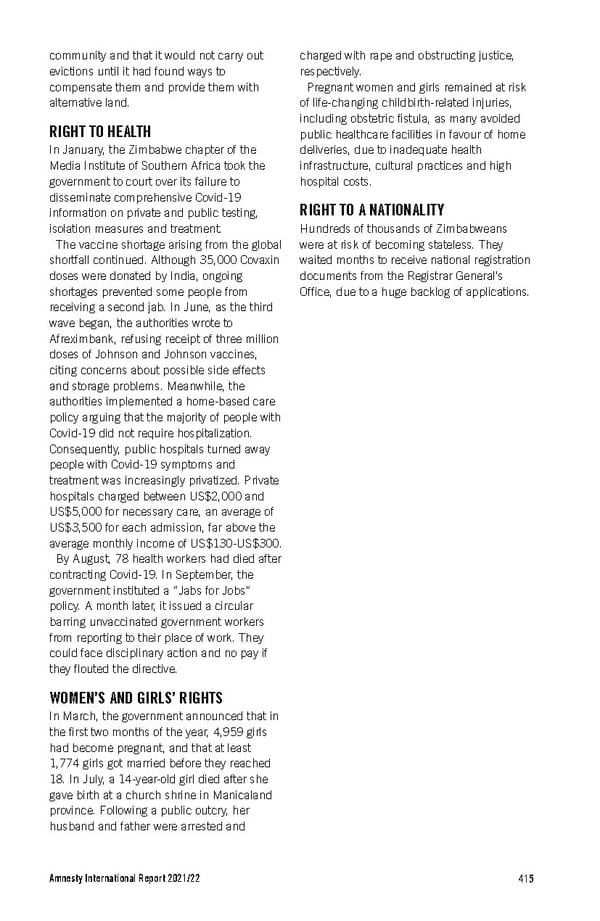community and that it would not carry out charged with rape and obstructing justice, evictions until it had found ways to respectively. compensate them and provide them with Pregnant women and girls remained at risk alternative land. of life-changing childbirth-related injuries, RIGHT TO HEALTH including obstetric fistula, as many avoided public healthcare facilities in favour of home In January, the Zimbabwe chapter of the deliveries, due to inadequate health Media Institute of Southern Africa took the infrastructure, cultural practices and high government to court over its failure to hospital costs. disseminate comprehensive Covid-19 RIGHT TO A NATIONALITY information on private and public testing, isolation measures and treatment. Hundreds of thousands of Zimbabweans The vaccine shortage arising from the global were at risk of becoming stateless. They shortfall continued. Although 35,000 Covaxin waited months to receive national registration doses were donated by India, ongoing documents from the Registrar General’s shortages prevented some people from Office, due to a huge backlog of applications. receiving a second jab. In June, as the third wave began, the authorities wrote to Afreximbank, refusing receipt of three million doses of Johnson and Johnson vaccines, citing concerns about possible side effects and storage problems. Meanwhile, the authorities implemented a home-based care policy arguing that the majority of people with Covid-19 did not require hospitalization. Consequently, public hospitals turned away people with Covid-19 symptoms and treatment was increasingly privatized. Private hospitals charged between US$2,000 and US$5,000 for necessary care, an average of US$3,500 for each admission, far above the average monthly income of US$130-US$300. By August, 78 health workers had died after contracting Covid-19. In September, the government instituted a “Jabs for Jobs” policy. A month later, it issued a circular barring unvaccinated government workers from reporting to their place of work. They could face disciplinary action and no pay if they flouted the directive. WOMEN’S AND GIRLS’ RIGHTS In March, the government announced that in the first two months of the year, 4,959 girls had become pregnant, and that at least 1,774 girls got married before they reached 18. In July, a 14-year-old girl died after she gave birth at a church shrine in Manicaland province. Following a public outcry, her husband and father were arrested and Amnesty International Report 2021/22 415
 Amnesty International Report 2021/22 Page 414 Page 416
Amnesty International Report 2021/22 Page 414 Page 416